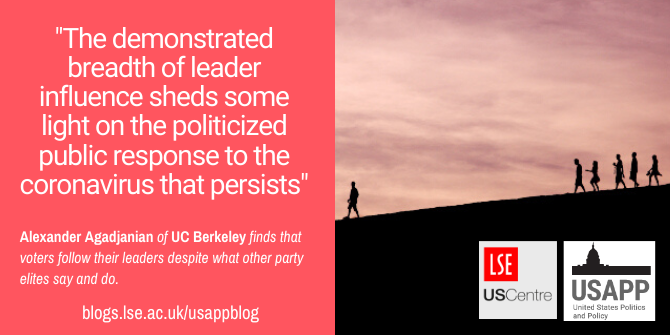 Since he became president, Donald Trump has departed from the traditional Republican Party platform in areas such as free trade policy. But how can we explain why so many Republican voters have changed their own views despite the opposition of party elites like members of Congress? In new research, Alexander Agadjanian finds that party elites have little influence compared to party leaders on partisans’ opinions about policy issues. The leader’s influence also remains undiminished even when party members are given information about the complexity of a policy, he writes.
Since he became president, Donald Trump has departed from the traditional Republican Party platform in areas such as free trade policy. But how can we explain why so many Republican voters have changed their own views despite the opposition of party elites like members of Congress? In new research, Alexander Agadjanian finds that party elites have little influence compared to party leaders on partisans’ opinions about policy issues. The leader’s influence also remains undiminished even when party members are given information about the complexity of a policy, he writes.
Months into the coronavirus pandemic, a persistent question remains: why are people divided in how much they embrace the recommended health advice and guidance such as to wear masks and to physically distance. And why are Republicans so resistant in particular? The size of the partisan gap in response varies by poll, to be sure, but has existed to some degree throughout the current crisis. An obvious culprit is rhetoric from political elites, such as Donald Trump. The US President has at various points downplayed the seriousness of the pandemic, called for reopening parts of society, and clashed with top doctors. The President of Brazil Jair Bolsonaro, has done the same. As other countries inch back toward normalcy, it comes as no surprise that the US and Brazil are unique in how ravaged they continue to be by COVID-19.
These events have laid bare the extensive influence of charismatic political leaders on how the public acts and thinks. But this is far from a new phenomenon. As political science research has documented, the public often “follows the leader,” bringing their issue opinions in line with their leader’s message—even when it’s at odds with their previous beliefs. Evidence for this pattern stretches back decades and transcends geographies. In a recent real world example, after years of support for the policy, Republicans rapidly soured on free trade during the 2016 campaign as Trump decried trade agreements.
In new research (ungated version here), I assess the factors which might dampen a prominent leader’s sway. I find that not only do fellow party members follow their leaders’ stances on non-mainstream policies, this influence tends to continue in the face of opposition from party elites like members of Congress. In addition, this tendency to follow the party leader remains even when partisans are better informed about the policy in question.
Can party elites check their leader?
For as much as it’s been studied, we know less about the scope of “follow-the-leader” behavior. If it diminishes when other informative signals are available, then leader influence is less powerful than we might think. For example, if the public is better informed about a policy they’re evaluating, are they less inclined to blindly adhere to their leader’s message? If so, perhaps we just need to improve people’s knowledge about public affairs to prevent leaders from having an undue influence. Similarly, when a prominent leader goes astray in message, can other elites within a party act as an institutional check by voicing opposition? This is crucial to examine given speculation that elites within the Republican Party are the key to curbing Trump’s power to avoid democratic backsliding.
To determine the extent to which the above factors come into play, I administered a survey experiment to nearly 2,500 Americans in early 2018. I included a design for Republicans and their party leader, Trump, and a design for Democrats and their comparably closest leader in Barack Obama. Both partisan groups evaluated a fictitious policy bill, with Republicans reading about a liberal infrastructure bill and Democrats reading about a conservative free trade bill.
To test for leader influence and its limits, I randomly varied the makeup of these policy descriptions. Within each partisan group, half of partisans saw that their leader endorsed the non-mainstream policy while the other half did not receive this message. Further, within each half, partisans either 1) learned that Congressional politicians in their party opposed the policy, 2) received substantially more policy information that highlighted the policy’s unfavorable qualities, or 3) received no conflicting signal. After partisans were assigned to one of these six possible experimental groups, they indicated their level of support or opposition to the policy.
My first step was to check whether leaders can persuade members of their party when conflicting signals are absent — I find confirmation for this pattern in both groups. Republicans who learn that Trump endorses a non-mainstream policy support that policy significantly more than when they are not aware of Trump’s position. Similarly, Obama endorsing a non-mainstream policy makes Democrats more supportive of it. These results replicate past work on Trump’s persuasive appeal and extend it to Democrats.
Next, I examine whether other elites within a party can check their leader’s influence. In the Republican design, the presence of Congressional Republicans opposing Trump on policy has practically no effect on reducing Trump’s persuasive power. Mass Republicans follow their leader to the same extent whether or not conflicts exists between elites. In the other design, Congressional Democrats opposing Obama’s message does diminish leader influence, but even then, Obama still exerts a sizable influence on how mass Democrats view the free trade bill.
Finally, I ask whether better informing partisans about policy makes them follow their leaders less. Highlighting the infrastructure bill’s exorbitant public spending and the federal government’s large role — among other details — does not reduce Republican’s propensity for following Trump when he endorses such a policy. This effect even holds among Republicans whom I identified as being anti-big government — in other words, those who should react most negatively. The same pattern roughly occurs on the Democratic side, as more information does little to remedy blind adherence to Obama’s message.

Photo by Jehyun Sung on Unsplash
Real World Confirmation?
A critic might see these results—uncovered in the confines of a controlled experiment—and wonder whether they carry any weight in the real world or apply to other areas. This question is important and mostly falls outside of the scope of my research. However, one episode during the Trump presidency fits nicely with my finding that GOP elites fail to curb their president’s opinion leadership.
In December of 2018, President Trump suddenly ordered the withdrawal of American troops from Syria, declaring victory against ISIS. Months earlier in April of that year, polling showed that a plurality of mass Republicans actually opposed this Syria troop withdrawal — 35 percent opposed it, 31 percent supported it, and the rest weren’t sure. Yet in the days following Trump’s announcement, the tides predictably shifted: a majority at 55 percent now supported troop withdrawal while only 28 percent opposed it.
Soon after Trump’s new position, the message environment quickly and durably changed. Over the next month, Congressional Republicans frequently voiced opposition to Trump’s decision. A vast majority of Republicans senators criticized and fought against the withdrawal, leading to headlines that read “Senate rebukes Trump’s plan to withdraw U.S. forces from Syria.”
This all made for considerable opposition to Trump’s message by elites from within the Republican Party — the same kind I tested for in my study. My results would suggest other elites cannot constrain Trump’s influence on how mass Republicans viewed the withdrawal. And indeed, in a poll shortly after the month of intra-party disagreement, 56 percent of Republicans still supported troop withdrawal while 27 percent opposed it — almost the same numbers as before GOP elites clashed with Trump. In sum, this real-world example shows that party elites really are unable to check a party leader’s ability to persuade.
Leaders are more persuasive than we thought they were
My arguments about the importance of follow-the-leader behaviors are not without their limitations. For example, the policies I focus on tend to be technical and less prominent in political discourse — perhaps the public defers to leaders less on easier, more important issues. Additionally, more research outside of an experimental context will better confirm our knowledge about elite leadership.
Nevertheless, my research offers some important takeaways. For one, I offer evidence for the bipartisan nature of follow-the-leader behavior. Second, the fact that partisans follow their leader even when they have compelling reasons not to do so suggests a broad scope of elite influence. Other research concludes the opposite, but does not use real world leaders (like Trump and Obama) like I do to test for messenger effects. Given how actual leaders are uniquely persuasive, my results suggests that the academic literature might be offering weak tests of political leaders’ influence on mass opinion.
Last, the demonstrated breadth of leader influence sheds some light on the politicized public response to the coronavirus that persists to this day. To the extent that the partisan gap is fueled by Trump’s rhetoric, better information or counter-messaging by other Republican politicians might not sufficiently make up ground in promoting good health behaviors. Instead, Trump reversing course and taking the pandemic more seriously could be the key — the symbolic concession of wearing a mask in public is hopefully one step in that direction.
- This article is based on the paper, ‘When Do Partisans Stop Following the Leader?‘ in Political Communication.
Please read our comments policy before commenting.
Note: This article gives the views of the author, and not the position of USAPP – American Politics and Policy, nor the London School of Economics.
Shortened URL for this post: https://bit.ly/3juZOH6
About the author
 Alexander Agadjanian – UC Berkeley
Alexander Agadjanian – UC Berkeley
Alexander Agadjanian is a political science PhD student at UC Berkeley. Before this, he worked at the MIT Election Lab for two years after graduating from Dartmouth College. He studies political psychology, political behavior, and race and politics, and his research has been published in Political Behavior, Political Communication, and Research & Politics.



